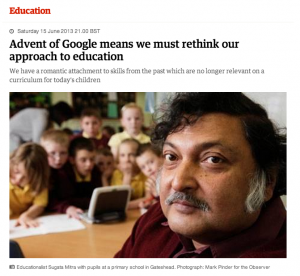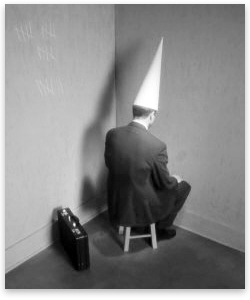curriculum expectations extensive reading language courses Language learning school management self-study TED
by sendaiben
2 comments
New Educational Paradigms
Sugata Mitra’s article in the Guardian on Saturday was very interesting. If you have seen his TED talks (and they are well worth watching), you will know the kind of educational changes he is looking to make.
What struck me is how similar it is to what my collaborator Daniel E. and I are trying to do at Tohoku University. There is a common thread running through our reading, discussion, presentation, and computer classes. We call it ‘practical’, ‘industrial’, or ‘student-focused’ English. To be honest, we haven’t found the perfect descriptor yet 😉
All of the classes are built on the following principles:
1. content and participation are student-generated
2. the bulk of the teacher’s work happens outside the classroom in planning and preparation
3. teachers have a coaching rather than instructional role
4. students are active and spend most of their time using English in pairs or small groups
5. teachers have high expectations regarding student achievement
We’ve mainly been talking about extensive reading so far, but there are plans afoot for a guide to leading discussion classes, with online study and presentation to follow after that. For now, you can catch us at the Extensive Reading World Congress in Seoul in September, or at JALT National in Kobe in October.
Or, you know, leave a comment here if you like!
curriculum expectations public policy school management teaching TED
by sendaiben
3 comments
Seth Godin on education
Seth Godin’s TED talk on education is really interesting.
Very similar to Ken Robinson’s talks, eh?
If you like his style check this one out: this is broken.
Do Japanese Elementary Schools Need More English?
Saw this article in the Asahi newspaper online yesterday. Basically, the government is leaning towards making English an official subject (it isn’t one at the moment, just an extra set of activities), which would mean more classes, and lowering the age at which students start learning English.
Great. This is yet another good idea that is going to be executed horribly.
You know what I would like to see in elementary school.
You know that Japan’s English teachers are on the whole undertrained and not proficient in English (only 20% of JHS and 35% of SHS English teachers have reasonable English qualifications).
I think there should be English classes in elementary school, but they need to be well-planned and implemented by teachers who know how to teach and are proficient in English. Sadly I don’t think we’re going to see either of those…
Am I being too pessimistic?
conference curriculum expectations extensive reading graded readers language courses presentations school management university
by sendaiben
5 comments
Student Reactions to Extensive Reading (Pan-SIG 2013)
I was at the Pan-SIG conference this weekend, held in Nagoya (the excellent Nanzan University hosted the event). This is the video of my presentation (a little shorter than usual):
Thanks to everyone who attended.
curriculum extensive reading graded readers materials readers school management university
by sendaiben
6 comments
More thoughts on the graded reader boycott
I really enjoyed reading all the replies to yesterday’s proposal. A few people thought that calling for a boycott was a bit harsh, but it was very interesting that so far not one person has offered a reason for publishers not to print word counts on graded readers.
My personal take is that some editors are not aware that word counts are a useful and, for some teachers and programs, essential tool.
I am going to proceed with the boycott. To assist in that effort and to help connect with publishers who are not yet aware of the issue, I am going to create a website listing various graded reader series in three categories:
- A Greenlist of series that clearly print accurate running word counts on books
- A Greylist of series that do not print word counts on books, but do make full and up-to-date word count information available on the Extensive Reading Foundation website
- A Blacklist of series that do not print word counts on books, and also do not make word count information available on the ERF website
I hope this will become a useful resource for teachers and institutions when they are choosing materials for their classes and programs. The site will be maintained and updated if conditions change (ie a publisher starts printing word counts on books, or makes the information available on the ERF site).


